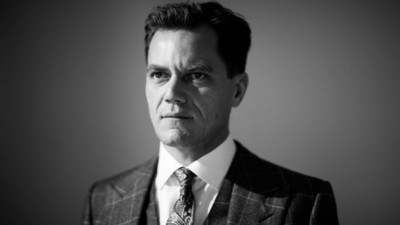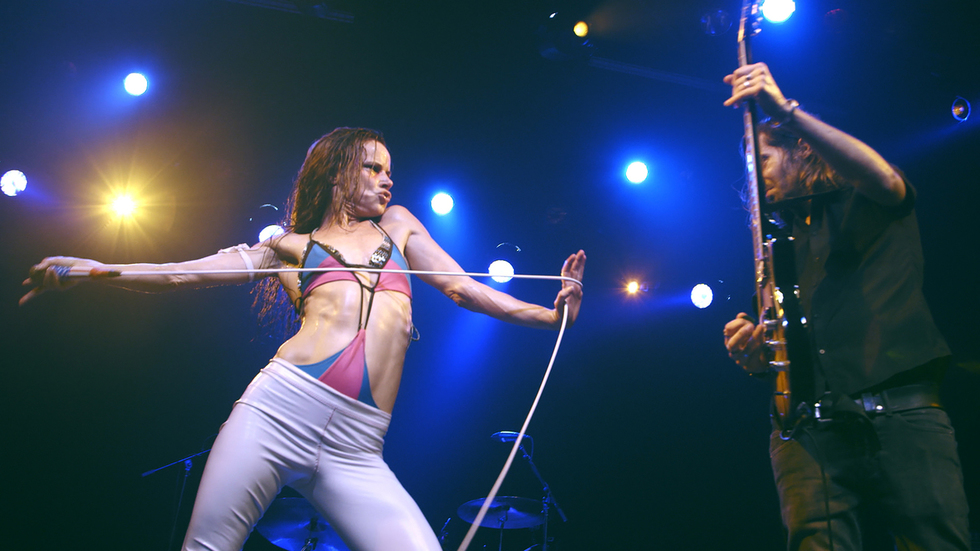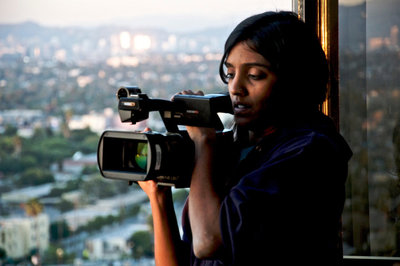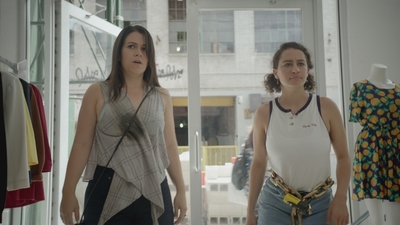
BY MATTHEW ENG |
Hard Lovin', Hard Workin' Woman: Juliette Lewis Talks Her Dual Careers
Juliette Lewis blazes into Tribeca 2016 with a personal new documentary profile and ferocious live performance.

There's a moment during the waterborne finale of Martin Scorsese's kinetic and criminally undervalued 1992 Southern thriller Cape Fear where Robert De Niro’s hard-charging killer, Max Cady, grabs at the hair of his arch-nemesis' teenage daughter, played by Juliette Lewis in of the most galvanizing screen performances of all time. Upon contact, Lewis lets out a scream of such primal, bone-quaking power that merely thinking about it offers a more palpable jolt than most performers can elicit in the moment. It's a roar that I never thought I'd hear again—until I heard Juliette Lewis sing.
Back in 2003, the free-spirited actress best known for offering indelibly instinctual performances in films like Husbands and Wives, Natural Born Killers, and Strange Days became the full-throttle front-woman for her own rock band, Juliette and the Licks, before ultimately disbanding the group and finding success as an adventurous solo artist/songwriter. Lewis’ late-in-life musical career is the focus of director Michael Rapaport's Hard Lovin’ Woman, an intimate and entertaining new documentary short named after one of Lewis' songs, a stripped-down confessional that goes down like raw honey. The film is set to premiere at the 2016 Tribeca Film Festival, where Lewis will also perform with the recently-reunited the Licks.
To watch Lewis’ musical performances is to experience the same unpredictable shockwaves that we’ve come to expect from her endlessly creative screen work. She lets loose with that famously raspy voice that can evoke a furious Janis Joplin, strutting around the stage with a panther pride and jerking her body with frenetic, unhinged movements that I can only describe as being akin, in the best possible way, to a banshee exorcism. Needless to say, this isn't just a famous actor’s part-time hobby. For Lewis and for anyone who has ever encountered her behind a mic, this is as real a deal as it gets.
Here, Lewis discusses the new documentary, Cape Fear, the professional pressures and personal triumphs of her musical and acting careers, and what it means to be a Hollywood survivor after nearly 30 years in the business.

How did Hard Lovin' Woman come about? Did you have any reservations about it?
Well, it's wild because for the longest time I'd wanted to make a documentary somehow, way back when, of life on the road. I'd been compiling footage so I had hours upon hours of stuff on the road and incredible audiences. For me, it was always like a love letter to the audiences we've played for. So that was shelved for a long time, for years.
And it wasn't until my friend Ted Newsome, who was a filmer on the project, came to me because he was working with Red Bull TV. And I was like, "Wow, yeah, I'd be into this!" But I do get nervous when there's other control involved because, you know, to document oneself, you're letting people in. Depending on the director, they can carve any narrative about you. It could be exploitative, it could be sensationalistic, it could be negative.
But when they said they were thinking of Mike Rapaport as the director, I said, "Fuck yes! This is magic!" Because me and Mike have known each for 20 years, and, not only that, not only would I trust him—it's that I saw his Tribe Called Quest documentary [2011's Beats, Rhymes & Life: The Travels of a Tribe Called Quest] and was knocked the fuck out. I said to him then, "You're a director." This isn't like watching my friend's film—it was, Oh wow, this is a whole other side of your talent. Mike's ability as a director, to really understand his subject and to showcase all these different aspects of the subject and to find a beautiful narrative, was really great.
It took me a minute to watch the thing objectively because you're watching yourself and we all have our own criticisms and self-conscious shit and all that stuff. But then, in the end, I was just knocked out by him and his editors and how they carved out a very positive narrative. "Positive" meaning something I hope would uplift and inspire other people to embrace life and the challenges of living even more. That's all I ever want to do. That's what I'm striving to do in my own life. And I want to give that to others.
You've talked frequently about knowing at various points in your life that you loved singing, but what was the exact breaking point when you knew that a music career was something you could no longer put off and had to pursue full-stop?
I can only liken my musical journey—and, I have to say, [as] a songwriter because, at the end of the day, it's this necessity to write songs that allows me to release emotion through music and lyrics and connect with other hearts and souls. I was living in the closet as a songwriter and musical person. [Laughs.] I didn't know how sad and unfulfilled I was until I started doing it. Ever since I was little-little, I always dreamed of being a semi-performance artist and singer and storyteller.
I got successful early on just making movies, and that can get out of your hands. It's almost where you're like, Who's guiding this? I thought I was and then [I'm] not. Success can sort of run away from you—I don't know the fucking metaphor. It can spin you for a loop! I went through a whole journey of reclaiming what it is that I want, what do I want to give, what do I want to do.
I'll tell you the breaking point. It was hitting age 30—Oh shit, you're 30 and you have not come out as a songwriter and performer. I was like, I better get started because I never want to live in regret of, Hey, why didn't you do that thing you love? I started so grassroots, calling people I know, saying, "Hey, I'm looking for a guitar player." I did it the old-fashioned way. I put a band together. I cut my teeth live. I wrote shitty songs, I wrote better songs, and, you know, learned it all by doing it.
The Licks broke up in 2009 but officially got back together in July of last year during a show at the El Rey. What spurred this reunion?
I had lost interest in the type of rock music I was playing, just like in acting, where I don't want to play the same part or the same character. I wanted to explore as a songwriter. After taking eight years off, I did that, I did acting, I wrote different songs, I went solo. And then there was something in me—I felt excited by the old songs we used to play. Because the type of rock music I wrote in the beginning, you have to feel it full-on. You can't fake it. So, I don't know, I felt that kind of celebratory aggression come alive in me and so I thought, Oh, I could perform these songs again. And then the other music I was writing, I thought, Oh, this stuff could sort of live together.
But the whole thing, the way I approach things now, is not to create too much pressure in my life and just see how it feels and I wanted to see if any people would show up. And when we sold out the El Rey, that was a big deal 'cause I don’t have a big label or big advertisers or anything. You just sort of have the love of what you're doing. So, as an artist, if people come, that means you have a future.

I'm sure that you get this question often, but I can't help myself from asking it: Where do you get your energy? Where does the ferocity of your stage—and screen—performances come from?
Awww, wait, I just got really emotional. Today is a year since my dad passed. And he and my mother are so instrumental in shaping the little wild card that I am. [Laughs] It's unexplainable but it’s really always from people. When I'm in a room and I’m performing this music I wrote and feel connected to, my intent is never just to stand there and sing songs. I actually want to change the frequency of the room… It's that big love. I get the energy from the actual love of what I'm doing and [from] wanting to release pain. There’s a mountain of pain to release from, whether it’s mine or the world’s or other people's. I feel like a conduit.
I saw Amy Berg's Janis and know that Janis Joplin is a pretty seminal inspiration for you, but even if I hadn't, her influence is so evident in your music and performances. Who else has shaped your identity as a performer?
It's a trip because my mom and my dad both had these big voices. I got the bass from my dad. He had a really full voice. Okay, but Janis… It's funny with your influences 'cause I didn't even know I connected so much to Janis until I saw her live, in footage. Because she, like myself—I feel like I'm channeling. Janis was channeling the frequencies. The music, it felt like it was popping through her whole body and so I connect with performers like that.
So, Tina Turner, for instance. She’s another one where you feel like she's feeling the music in every cell of her body. But then there's beautiful people whom I’ve been fortunate enough to go on tour with, like Cat Power or Chrissie Hynde. I think I'm influenced by people that are so innately who they are and there’s no other voice like them. Voice meaning whatever creative thing they’re doing. So Patti Smith… Blondie! Grace Jones! Nina Hagen! You know, all the queens. The queens of everything.
There's a moment in Hard Lovin' Woman where you talk about your stage performances, which involve semi-elaborate costumes that are then shed away to reveal a much more raw and exposed version of yourself. This seems like the opposite of the acting process, where you're adopting different disguises and personas in order to reveal someone else. Do you find that your music and film work feed each other, or do you prefer to keep them separate?
They totally feed each other. Each one is either a reflection, a response to, or a rebellion of the next. What you're saying about shedding—that's me shedding all this stuff that was just put on me as an artist or a performer… My whole thing has always been kind of gritty and very homemade because it's also a very independent operation. There's nobody else, no big business, no label helping. I like the idea—fuck, I'm going to get all weird on you…
Please do!
But I think of that book The Little Prince—talk about influences. I keep this story in my mind of the Little Prince who fell to earth, and then what if he/she discovered a treasure chest of garments and stuff but lived within the animal kingdom? [Laughs.] That's what I feel like on stage but, in the end, you're of the earth. But acting is a bit more cerebral and music is more visceral. So how I would use music is [I] could listen to Chet Baker or Neil Young solos and get instantly moved in five seconds. To me, that was the shortcut to any emotional life I wanted to create for a character. I always use music in every job I did. Like, for Natural Born Killers, I was listening to Jimi Hendrix's "Voodoo Child" and "Killing Floor" and some blues stuff. They relate. They connect.
You played a rock star early on in your career in Kathryn Bigelow's great Strange Days and played a former punk singer in the recent Kelly and Cal, but there hasn't been a film that merges your musical talents fully. Are you looking for roles that combine the two, or are they hard to come by?
It's hard to merge because I've only seen these sort of very pedestrian tales of making it that are old-fashioned and not even a current journey. But with that said, I did write a script that I want to co-direct with my writing partner; I want to act in it and score all the music because it's an extension of what [my character] is hearing and feeling in her head… But yeah, I don't know, I'm always looking! There are so many incredible stories to tell. We'll see what finds me.
Do you find that the fans who love you as a musician are different from the ones who know you best as an actress? Is there a lot of overlap among the two groups?
Yeah! It's so cute that you asked that because one of my favorite things about my audiences is the diversity. Especially when I went all around the world and even in the states, at the end of the day, who's sort of coming back to my shows are people that really got off on the music and the show and would tell friends. It’s very organic in that way. But I've seen everyone: young and old, hardcore and strait-laced. My pride and joy is the audiences. Not all of them knew my film work. Some of them did, of course. But I’m always excited by who shows up.
How have you changed as an actress since embracing your identity as a musician?
I've always been a really weird actress. [Laughs.] Well, maybe not. Maybe we're all weird. I have actor friends who I think really enjoy the exercise of it. I've always gone a little batty by it 'cause I do want to explode it all like a live performer would. But that's the challenge of it is doing narrative stories in another skin or as another person.
I just did this project with Amanda Demme that’s straight-up performance art where I physically interpret the seven deadly sins. I think that's my future. Maybe silent films. I don't know where I'm gonna go in the future.
Cape Fear turns 25 this year. Seeing you in that for the first time was a truly life-changing experience for me. What are your memories of making it?
I'm not formally trained. I'm not an academic in the world of acting. Scorsese, De Niro, Jessica Lange, Nick Nolte—those are my teachers. That was the first movie I really was encouraged to go the distance and trust my instincts, and I just grew. I became who I was as an actor versed in naturalism from that and from the freedom I was given and from the instruction I was given. It was an incredible, life-changing experience in so many ways.
The thing is, the nine-minute scene with De Niro, I didn't know until Marty told me that it was nine minutes, and that’s a rarity. Normally you go from scene to scene and you're telling a story. That scene just goes down—I can't describe what it was to do it but it was the deepest emotional tango with a master in cinema. [Laughs] It felt... What's the word? Transcendental! [Laughs.] Out of body. It felt like that, even at a young age.
You've been in this industry since you were a teenager and you're still one of the most respected and recognized figures working today, which is a rare achievement. How have you managed to survive Hollywood?
Jesus. [Laughs.] My first answer is, Good God, Lord only knows. But no, it's priorities and knowing who you are, which is a lofty plight. I just feel gushy about my parents and my bizarre Bohemian, very artistic, nurturing childhood. I wasn’t stifled in ways that people can be. It wasn't to say that I didn't have insecurities and fears and all that but I could land on my feet in a way, with some kind of dignity and self-confidence. There’s all this other superficial stuff that never appeals to me. In fact, I probably revolted. But that superficial feeling of, Like me, like me! Look at my face and here are my lips, blah, blah, blah. I never wanted to be known for my looks—I was almost insulted if people talked about beauty or youth because those are your prisons, especially if you're female and creative. You hope to move people.
But, what have I done? I also took time off! I did self-work, I cultivated a spiritual core for myself. I'm 42 so, more than ever, that stuff is important. Your friends are important and what you invite into your space, what you put out, is important. You have to be really responsible for that.


